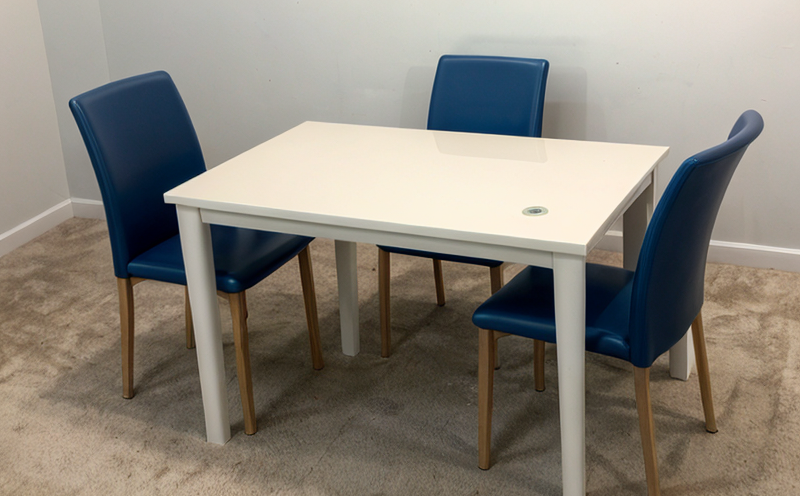NF EN 1811 Migration Testing of Plastics with Metallic Decoration in Furniture
The NF EN 1811 standard specifically addresses the migration testing of plastics used in furniture that incorporate metallic decorations. This test ensures that any potentially hazardous substances, including heavy metals and other chemicals, do not migrate from these materials into contact with human skin. The primary focus is on ensuring compliance with safety regulations for consumer products.
This type of plastic typically includes materials like polyurethane foams, vinyls, or even certain types of wood finishes that are laminated with a metallic layer. The standard applies particularly to items such as armchairs, sofas, and other upholstered furniture where the metal finish is a crucial design element.
Migration testing under NF EN 1811 involves placing test specimens into contact with water or another specified solvent for a prescribed period of time. After this period, the liquid is analyzed to determine if any chemicals have leached out from the plastic matrix and metallic surface. The test parameters are strictly defined by the standard, ensuring consistency across different laboratories.
Specimen preparation is critical for accurate testing results. This involves cutting samples from the furniture components in a manner that replicates the actual contact area with human skin during use. The size of each sample must adhere to the specified dimensions provided in NF EN 1811, which ensures uniformity in testing.
The test apparatus used typically includes a container for holding the specimen and solvent, along with a mechanism for shaking or agitating the solution to simulate real-world conditions more closely. The choice of solvent can vary depending on the specific requirements set out by NF EN 1811 for different types of plastics.
Acceptance criteria are stringent, ensuring that any migration rates detected must fall below specified thresholds deemed safe for human exposure. Compliance with these standards is crucial for manufacturers to avoid potential legal issues and maintain consumer trust.
The significance of this testing cannot be overstated in the furniture industry. It helps ensure product safety, especially given the increasing trend towards using metallic finishes on plastics due to their aesthetic appeal and durability. By adhering to NF EN 1811, manufacturers can demonstrate their commitment to producing safe products that meet international standards.
Failure to comply with these regulations can lead to severe consequences, including product recalls, legal action, and damage to brand reputation. Therefore, investing in comprehensive testing is not only necessary but also essential for maintaining a competitive edge in the market.
Benefits
The NF EN 1811 migration testing offers numerous benefits that extend beyond mere compliance with regulatory requirements. It enhances product safety, which is paramount in an industry where consumer trust plays a significant role. By adhering to this standard, manufacturers can ensure that their products meet stringent international standards, thereby gaining credibility and potentially expanding their market reach.
From a business perspective, meeting these standards reduces the risk of legal action and product recalls. This proactive approach helps protect both brand reputation and consumer goodwill. Moreover, it fosters better relationships with customers, suppliers, and regulatory bodies, creating a more stable operational environment.
The testing process also provides valuable insights into potential risks associated with material choices. This knowledge can guide future R&D efforts towards safer and more sustainable materials without compromising on quality or design aesthetics. For procurement teams, it ensures that they are sourcing high-quality raw materials that meet the stringent requirements set by NF EN 1811.
Ultimately, compliance with this standard contributes to a safer work environment for employees involved in product development and production processes. It also supports the overall sustainability goals of many organizations by encouraging responsible material usage practices.
Customer Impact and Satisfaction
For customers, peace of mind is one of the most significant impacts of NF EN 1811 compliance. Knowing that furniture they purchase meets stringent safety standards reassures them about their health and well-being. This assurance can translate into higher customer satisfaction levels, leading to repeat purchases and positive word-of-mouth recommendations.
Compliance with this standard also enhances brand image by positioning the company as a leader in product safety and quality. Positive reviews from satisfied customers further reinforce this perception, creating a virtuous cycle that benefits both the manufacturer and the consumer.
The testing process itself can be seen as an investment in customer satisfaction. It demonstrates the manufacturer's commitment to excellence and attention to detail, which are key factors influencing customer loyalty. Furthermore, it helps build long-term relationships with customers who value safety above all else.
For those concerned about environmental impact, NF EN 1811 compliance aligns perfectly with sustainable practices by promoting responsible material selection and usage. This alignment can appeal to environmentally conscious consumers, broadening the customer base significantly.
Competitive Advantage and Market Impact
- Reputation for Quality: Compliance with NF EN 1811 enhances a company's reputation as a leader in product safety. This can be a deciding factor when consumers are choosing between different brands.
- International Markets: Meeting these standards opens up opportunities to sell products internationally, where many countries have similar or even more stringent regulations.
- Customer Trust: Demonstrating adherence to such a rigorous standard builds trust with customers, leading to increased sales and customer loyalty.
- Innovation: The testing process can inspire innovation in safer materials and processes, giving manufacturers an edge over competitors who may not invest in similar testing.
- Sustainability: By ensuring that no harmful substances migrate from the furniture into human contact areas, companies promote sustainable practices that align with global trends towards eco-friendly products.
The NF EN 1811 standard thus provides a competitive advantage by setting a high bar for product safety and quality. It not only protects consumers but also differentiates brands in crowded markets, making them more attractive to discerning buyers who prioritize health and safety above all else.





